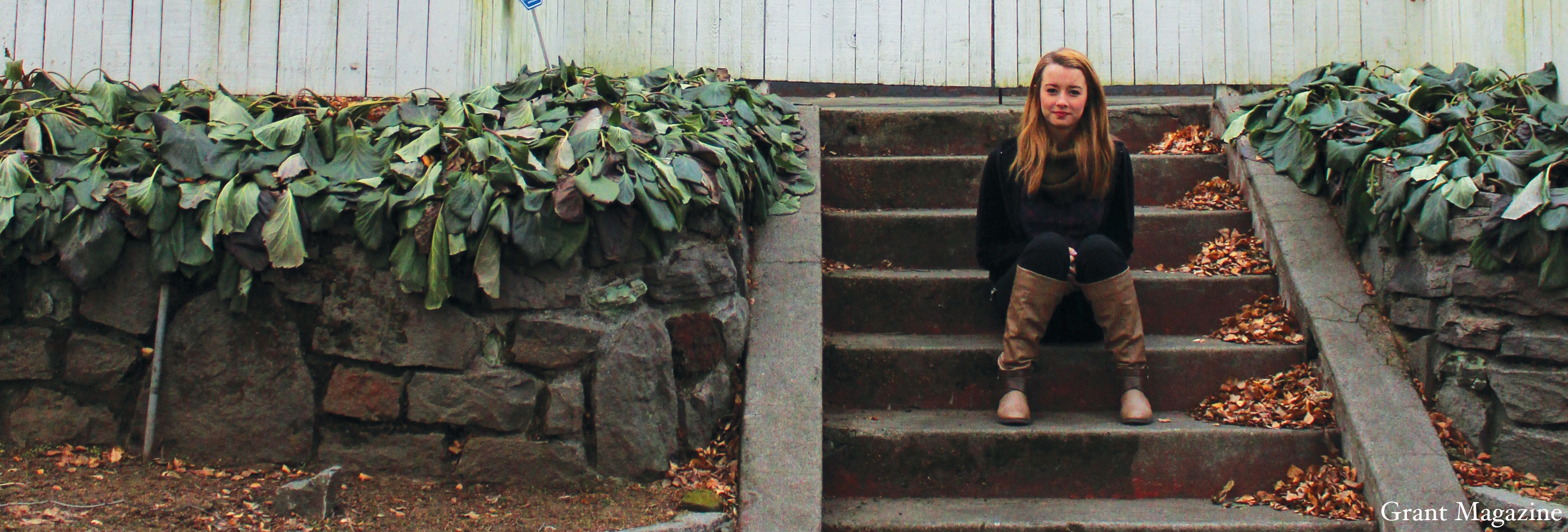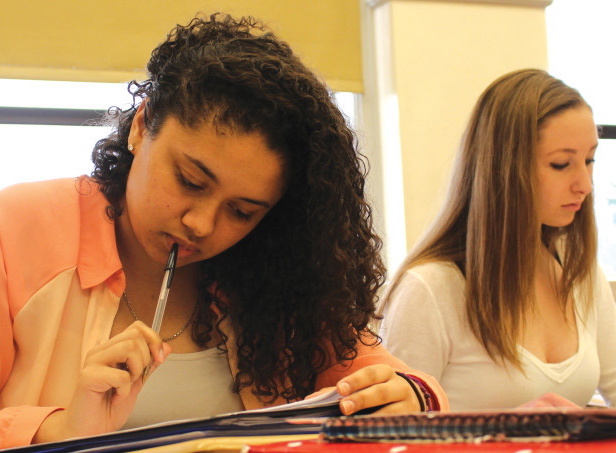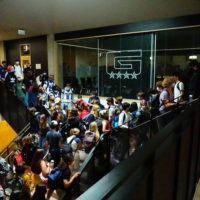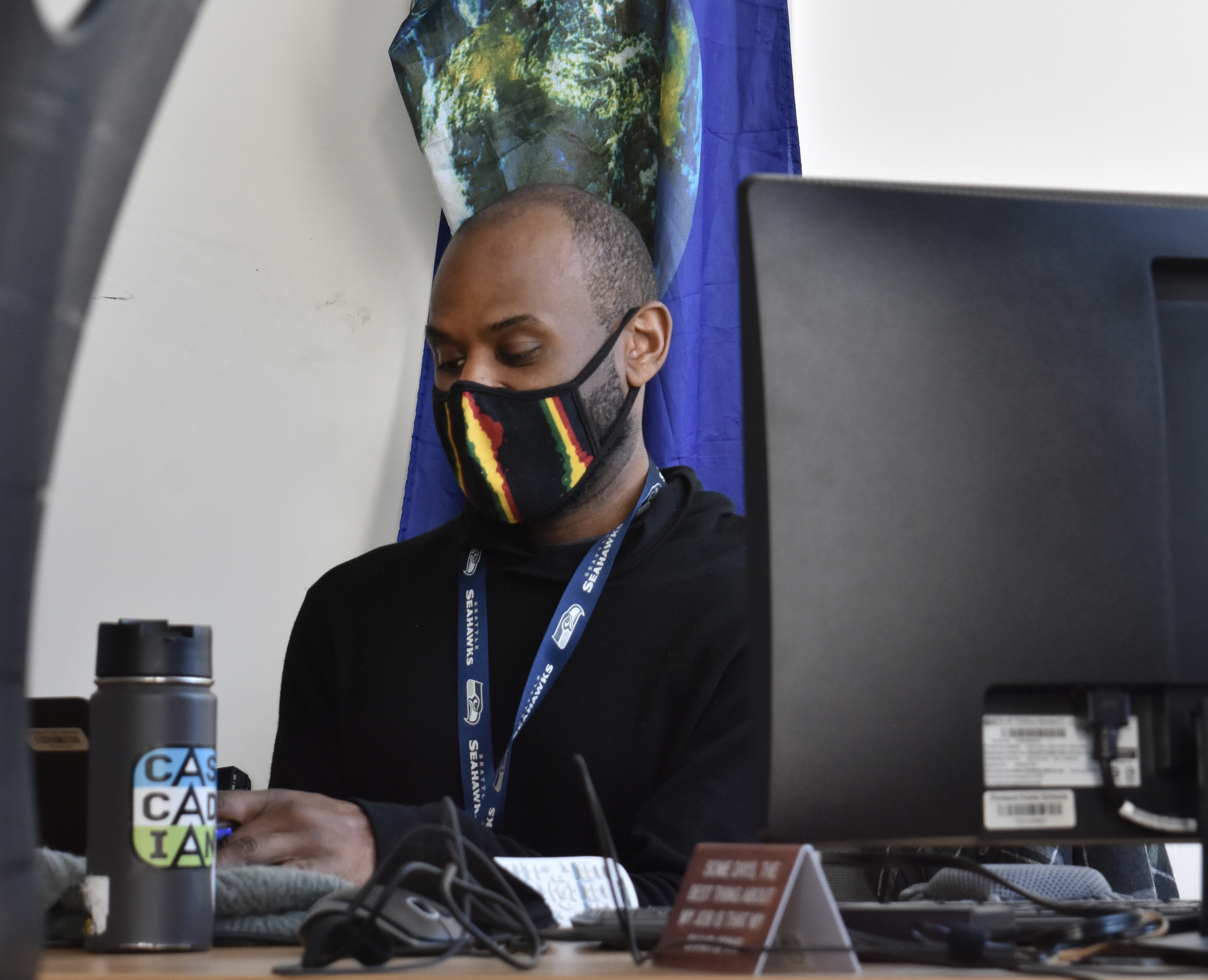
The rich greens of Forest Park’s trees frame Gerald Scrutchions’s vision as he runs along a bark chip trail. Despite his labored breathing and heavy legs, it is here where he is at peace. His time running is meditative, even with the physical strain. He returns home after eight miles and readies himself for the workday ahead.
After 11 years as an educator, the 2021-2022 school year might be Scrutchions’s last in the profession. There are a number of factors pushing him away from the job: fatigue, workload and the never-ending conflicts that surround education among them. The most prevalent, though, has nothing to do with the profession.
Scrutchions’s passion for health and wellness is prompting him to consider pursuing a career in the field full-time. He already teaches yoga and fitness classes at two Portland area gyms, Flex & Flow PDX and Knot Springs, and his love for those occupations drives him to dive fully into the fitness world.
“Yoga really helped me understand a full expression of who I am,” he says.
Scrutchions was born in Chicago and grew up 20 minutes outside of the city. His mom worked in federal law enforcement and his dad was a broadcast engineer at a radio station. “Chicago is really diverse,” Scrutchions says, “So, you know, a pretty diverse neighborhood with lots of different ethnic groups, people living in a pretty tight-knit community.”
When Scrutchions was in fourth grade, his mother’s work transferred her to Allegan, a town of 5,000 in western Michigan. Scrutchions stayed with the rest of his family in Chicago until seventh grade, when he moved to Allegan with his mom.
Scrutchions’s mom pulled him out of school in Chicago because he was struggling to stay afloat. “During the 90s, young Black boys like myself were ripe for gang recruitment,” Scrutchions says, “I was definitely headed that way, not because I wanted to, or didn’t have support from my family, it was just difficult to compete out there rolling solo.”
Scrutchions describes the transition to Allegan as abrupt and unexpected. “One day, my mom, unbeknownst to me, was in the area, she came and pulled me out of that school,” he says, “Literally the next day I started at a new school that was completely different from my lived experience.”
Allegan and Chicago were polar opposites. Scrutchions reflects on the change, saying, “I went from living in a big city to kind of like a rural and homogeneous white place.”
Despite the big shift, Scrutchions says that he is thankful for time in Allegan. “I learned how to be comfortable outdoors, to be comfortable in rural spaces, to be comfortable swimming in lakes in the summer instead of pools.”
He says that in a way, these experiences helped him connect with his African ancestors. “When we talk about roots, being a person of African descent, what it was like to live in Africa, it was walking barefoot and being outside,” he says, “There’s been a complete disconnection from that over the last 100 years for Black people, there’s a disconnect with outdoor spaces and how to access them.”
During high school, Scrutchions leaned into athletics. He played tennis, ran track and played football. Football was his primary sport and his skills drew attention from college coaches across the country. Despite the interest, high school would be where his football career ended. “I just really didn’t have the grades to go to any of the schools that were sending out the letters,” he says.
He graduated high school in 1997 and left for the University of Wisconsin-Whitewater. At first, college was chaotic for Scrutchions. “College was a doozy for me. When I got there, I was super immature. Between class and partying, I decided that I would do the latter.”
After being put on academic probation during his sophomore year, Scrutchions decided that he needed to leave UW-Whitewater. He says it was obvious that it wasn’t a good fit for him. “We consciously decided that it just wasn’t the right place, and that’s when I took off to Madison. I started going to community college there and that was exactly what I needed.”
Scrutchions thrived in Madison. “It’s this beautiful place, it’s culturally diverse and you have a chance to be immersed into what it is like to be in a college town and be around people who are at all different levels of college,” he says. He spent four semesters at a community college, where he made the Dean’s list every semester except for his first.
Aside from playing intramural sports in college, fitness took a backseat to his education.
When he was 22, a year before he left Madison, he started running long distance, which he still does and loves to this day. “I kind of got back into fitness with running and spent basically an entire year doing it.”
In 2003, Scrutchions moved west to attend Portland State University, graduating with a bachelor’s degree in Criminology and Criminal Justice in 2005. Early on in his time in the Pacific Northwest, he met Lindsay Kearl while they were both working at a pizza shop.
The two bonded over their love for trail running and music and started dating a few months later. “In Madison, (Kearl and I) lived only three blocks away from each other, but we actually met in Portland,” Scrutchions says.
In 2007, Scrutchions and Kearl moved back to Madison after Kearl was accepted into law school at the University of Wisconsin-Madison. Three weeks after they left Portland, they found out that they were expecting a child, and got married the following year.
Their daughter Juna was born while Kearl was still in law school, so Scrutchions was a stay-at-home dad. His daughter’s birth prompted him to start paying attention to his health and fitness again. He wanted to get back into shape and decided to try something new: kickboxing.
“I took my first kickboxing class, and I was like ‘oh, I love this,’” he says, “It’s one of the only things you can do that you’re learning something about technique and you’re also getting a high amount of cardio.” Since his first class, he’s competed three times.
During the Great Recession of 2008, the year after his daughter was born, Scrutchions was driving cabs around Madison and not making much money. “I really needed to decide what I was going to do with my life,” he says.
He decided on graduate school, with the intention of becoming a teacher. Scrutchions attended Edgewood College in Madison and earned graduate degrees in Social Studies and Special Education.
He started student teaching in 2011, and his son Louie was born that spring.
For the next three years, he worked in special education at a middle school in Madison. “It was kind of a high needs school. You work with students with emotional disturbances or that have faced trauma, and it was intense,” he says, “I learned a lot really quick.”
A lighter class load during his second year motivated him to do his thesis work, which focused on adolescent identity and cultural competency. “Cultural competency is like understanding the people that you’re working with and being able to communicate with everyone … not just people from your own culture, but people from other cultures as well,” he says.
The research he did proved to be valuable. “I still reference (the authors I studied) today, and it really helped me to understand the flaws in our system that are presented as well.”
Scrutchions taught special education for three years until he and Kearl moved their young family back to Portland. In 2014, Scrutchions got a job at Roosevelt High School in North Portland teaching Advancement via Individual Determination (AVID).
After two years teaching AVID, Scrutchions decided that he wanted to teach social studies. “I wanted to utilize what I know, so I started teaching at King School in Northeast,” he says.
He worked at King for three years, and while he was there, he wrote an article about the importance of how we teach about United States history. “It’s about the importance of backing away from this foundational narrative that we have provided in the United States and starting to teach this multi-perspective way of social studies and history,” he says, “And also, creating this atmosphere where people speak to each other.”
Scrutchions’s dive deeper into the intricacies of the education system coincided with an unexpected discovery of what would become a lifelong passion: yoga.
He wouldn’t have started practicing, though, if it weren’t for a relatively catastrophic injury. On Christmas Day in 2016, Scrutchions tore his rotator cuff while snowboarding. Three months after a diagnosis was put off, he made an impressive recovery, and the injury would turn out to be a blessing in disguise: At a follow-up appointment, his doctor recommended that he try yoga. “I was reluctant; I would never think of anything like that,” Scrutchions says.
He gave yoga a shot, and fell in love with it as instantly as he did with kickboxing. “I started to quickly improve, I think thanks to the fact that I was already pretty athletic, so I progressed quickly from doing regular flows to being able to do like arm balance.”
Scrutchions did a yoga instructor training in 2018, just two years after he started practicing. In addition to education and a certificate, the training gave him community. “We all have a great affinity for each other,” he says.
Eventually, Scrutchions was effectively working two jobs, both of which had education at their core: a yoga instructor and a social studies teacher.
When Harriet Tubman Middle School opened, Scrutchions was relocated there and continued to teach social studies. He also mentored and advised a group of students who were worried about the poor air quality that plagued Tubman’s I-5 adjacent campus.
“We just started to raise hell about the air quality around the school, which is still going on to this day,” Scrutchions says, “I ran the Environmental Justice Club there for the time that I was there, but there came a point where I really needed to get out of high needs schools.”
Scrutchions told the district he wanted to leave Tubman and got a job teaching social studies at Grant. His first year was the 2020-2021 school year, which was all online except for a few months of hybrid learning at the end of the year.
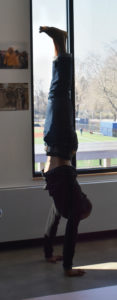 This school year is Scrutchions’s first teaching at Grant fully-in person, and it could shape up to be his last. “I try to do as much as I can for the students, but I’m at a point where I’m pretty burned out,” he says.
This school year is Scrutchions’s first teaching at Grant fully-in person, and it could shape up to be his last. “I try to do as much as I can for the students, but I’m at a point where I’m pretty burned out,” he says.
In addition to working at Grant, he teaches yoga and fitness classes at local studios. He also runs long distance and kickboxes during his free time.
Scrutchions says he can’t see himself continuing in education, and has been thinking about leaving for a long time. His ever growing love for fitness and a variety of stressors associated with teaching have been slowly pulling him away from the profession. “I think it’s important to do more than one thing in life,” he says, “I want to work in health and wellness, not only with adults, but with young people too.”
Scrutchions says his breaking point was the nationwide discussions and outcry claiming that “Critical Race Theory” was being taught in schools.
The curriculum Scrutchions is tasked with teaching fits the profile of what conservatives around the country are so riled up about. He teaches Living in the U.S., a junior history class that seeks to educate students through the lens of marginalized groups and to shed light on stories that are traditionally ignored.
“I’m not teaching you how to hate, but I’m teaching you about the past and those systems of hate, so we understand that and don’t repeat them again,” he says, “But that’s not what’s being understood by the broader aspects of America.”
He says that teaching such an impactful class feels like a lot of responsibility. “It makes it feel so heavy to teach it, and I am just exhausted.”
His massive workload is one of the main contributors to his fatigue, and forces him to spend less time with his family. “I went from having 75 students at a time last year to having now 190 students,” he says, “I feel like I’m missing my kids growing up.”
“I believe that my time is up in education,” Scrutchions says, “And maybe it’s time to take a risk, and that risk is either helping people with health and wellness in the realm of public education or stepping out and doing the work outside of it.”
For Scrutchions, working in health and wellness within the realm of public education could look like working to get yoga expanded in schools and potentially teaching it at Grant if the opportunity arose. “I think yoga is really a safe haven for people who have not always felt safe in the physical education setting,” he says.
Even with his desire to leave, Scrutchions says that transitioning out of teaching is easier said than done. “Don’t be surprised if, like, next year, you show up and I’m still here.”
According to EdWeek, only 7% of educators in public schools are Black. “I know we have an issue of retention of Black educators in PPS, and I feel like there is some pressure to stay because we don’t want that number to keep going down, but also, there comes a point where I need to take care of myself,” Scrutchions says.
Despite the challenges he’s faced, Scrutchions is thankful for his time in education. “I’m happy to be a public servant. I come from a family of public servants, and I’m glad to have continued that.”
Scrutchions will finish out the remainder of the 2021-2022 school year, but isn’t sure yet where he’ll be next September. For him, to pursue a career in fitness would be to take a risk. “And we only learn by taking risks,” he says.♦

